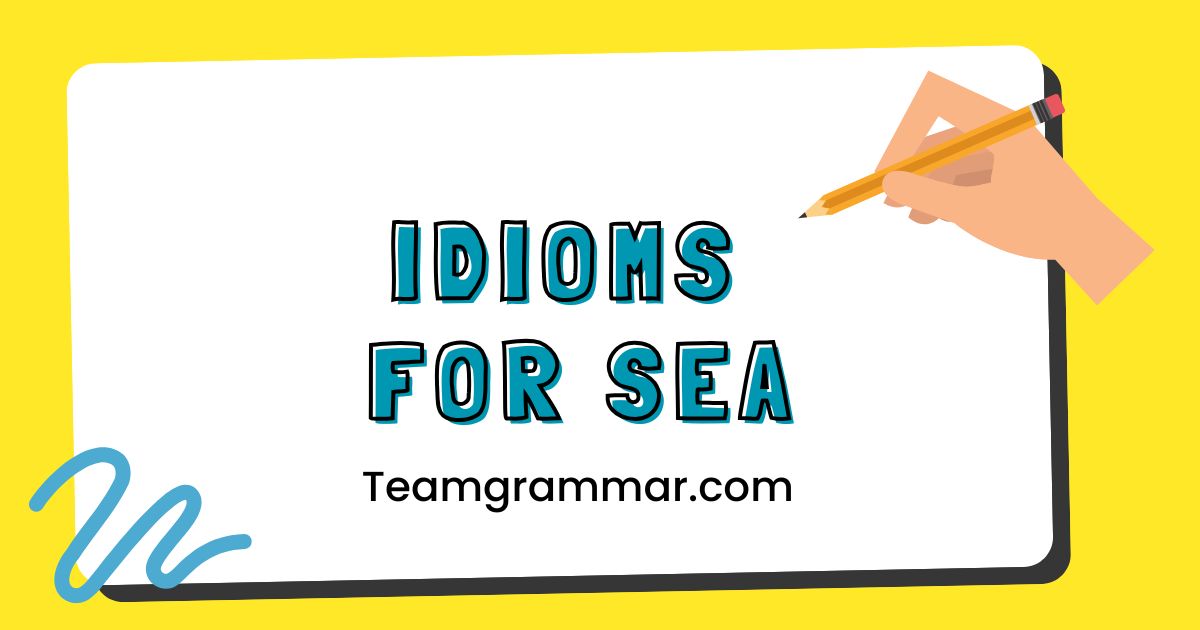28 Idioms Ahoy! Mastering Sea-Related Expressions
The English language is an ocean of words, filled with colorful idioms that add depth and nuance to our communication. Sea-related idioms, in particular, are abundant and often used in everyday conversations and writing.
Understanding these idioms is crucial for mastering English fluency and comprehension. This article will navigate you through the most common and intriguing sea-related idioms, providing definitions, examples, and practical exercises to help you confidently incorporate them into your vocabulary.
Whether you’re a beginner or an advanced learner, this guide will equip you with the knowledge to sail smoothly through the sea of English idioms.
Table of Contents
- Introduction
- What are Sea-Related Idioms?
- Structural Breakdown of Sea Idioms
- Types and Categories of Sea-Related Idioms
- Examples of Sea-Related Idioms
- Usage Rules for Sea-Related Idioms
- Common Mistakes with Sea-Related Idioms
- Practice Exercises
- Advanced Topics in Sea-Related Idioms
- Frequently Asked Questions
- Conclusion
What are Sea-Related Idioms?
Sea-related idioms are expressions that use nautical terms, marine life, or the imagery of the ocean to convey a figurative meaning. These idioms often derive from the historical importance of the sea for transportation, trade, and exploration.
They add color and depth to the English language, allowing speakers to express complex ideas in a concise and vivid manner. Understanding these idioms requires recognizing that their literal meanings are often unrelated to their intended interpretations.
Classification: Sea-related idioms fall under the broader category of idioms, which are fixed expressions with non-literal meanings. They can be further classified based on their origin, such as nautical terms, or their thematic content, like weather or marine life.
Function:The primary function of sea-related idioms is to enhance communication by providing a more expressive and imaginative way to convey ideas. They can add emphasis, humor, or emotional depth to a message.
They also serve as cultural markers, reflecting the historical relationship between English-speaking societies and the sea.
Contexts:These idioms are used in a wide range of contexts, from casual conversations to formal writing. They appear in literature, journalism, business communication, and everyday speech.
The specific idiom used will depend on the intended meaning and the audience.
Structural Breakdown of Sea Idioms
Sea idioms, like all idioms, are fixed expressions, meaning that their structure and wording are generally inflexible. Changing the words or grammatical structure can alter the meaning or render the idiom nonsensical.
They often consist of a combination of nouns, verbs, adjectives, and prepositions that, when used together, create a unique figurative meaning.
The structure of these idioms can vary. Some are simple phrases, while others are complete sentences.
For example, “smooth sailing” is a simple phrase, while “in the same boat” is a prepositional phrase used within a sentence. The key is to recognize the entire phrase as a unit, rather than analyzing each word individually.
Understanding the grammatical roles of the words within an idiom can sometimes provide clues to its meaning, but this is not always the case. The figurative meaning often transcends the literal meanings of the individual words.
Therefore, memorization and contextual understanding are crucial for mastering sea idioms.
Types and Categories of Sea-Related Idioms
Sea-related idioms can be categorized based on their origin and thematic content. This categorization helps in understanding the nuances and contexts in which they are used.
Nautical Origins
These idioms are derived from the language and practices of seafaring. They often refer to specific parts of a ship, sailing techniques, or maritime customs.
Examples include “know the ropes,” “taken aback,” and “run a tight ship.” These idioms reflect the historical importance of seafaring and the challenges faced by sailors.
Weather-Related Sea Idioms
This category includes idioms that use weather conditions at sea as metaphors for various situations. Examples include “weather the storm,” “a sea change,” and “make heavy weather of something.” These idioms often relate to overcoming difficulties or experiencing significant transformations.
Sea Animal-Related Idioms
These idioms draw on the characteristics and behaviors of marine animals to describe human traits or situations. Examples include “a whale of a time,” “fishy,” and “swim with the sharks.” These idioms often add a humorous or descriptive element to communication.
Examples of Sea-Related Idioms
The following tables provide extensive examples of sea-related idioms, categorized for clarity. Each idiom is defined and illustrated with example sentences.
General Sea Idioms
This table includes idioms that use general sea imagery to convey figurative meanings. These idioms are commonly used in everyday conversation and writing.
| Idiom | Definition | Example Sentence |
|---|---|---|
| Smooth sailing | Progressing without difficulty | After the initial challenges, the project was smooth sailing. |
| In the same boat | Facing the same difficult situation | We’re all in the same boat when it comes to the rising cost of living. |
| Make waves | Cause trouble or disturbance | He’s always trying to make waves with his controversial opinions. |
| A drop in the ocean | A very small amount compared to what’s needed | The money we raised was just a drop in the ocean compared to the total cost. |
| Rock the boat | Cause disruption or instability | I don’t want to rock the boat by suggesting too many changes. |
| All at sea | Confused or uncertain | I’m all at sea with these new regulations. |
| Run deep | To be strongly felt or have significant impact | The resentment between them runs deep. |
| Lost at sea | Feeling disoriented or without direction | After losing his job, he felt lost at sea. |
| Sea of faces | A large crowd of people | The performer looked out at a sea of faces. |
| Turn the tide | Reverse a negative trend or situation | The new strategy helped to turn the tide in the company’s fortunes. |
| Sink or swim | Succeed or fail by one’s own efforts | The company’s new employees are left to sink or swim. |
| Come hell or high water | No matter what happens | I’m determined to finish this project, come hell or high water. |
| Plunge into something | Start doing something with enthusiasm | She decided to plunge into her new career without hesitation. |
| A sea change | A radical transformation | The internet has brought about a sea change in the way we communicate. |
| Keep your head above water | Manage to survive or cope with difficulties | It’s hard to keep your head above water when you’re starting a new business. |
| Go overboard | Do something excessively | He tends to go overboard with the decorations for Christmas. |
| Make a splash | Attract a lot of attention | The new product made a splash in the market. |
| Dead in the water | Failed or no longer progressing | The project is dead in the water due to lack of funding. |
| Plain sailing | Easy and straightforward | Once we got the initial setup done, it was plain sailing from there. |
| Beached | Stranded or unable to move forward | After the accident, his career was beached. |
| Deep dive | Thorough investigation or analysis | Let’s do a deep dive into the data to understand the trends. |
Nautical Idioms
This table focuses on idioms that originate from nautical terms and seafaring practices. These idioms often have a more specific and technical origin.
| Idiom | Definition | Example Sentence |
|---|---|---|
| Know the ropes | Understand the procedures and skills needed for a job | It takes a while to know the ropes when you start a new job. |
| Taken aback | Surprised or shocked | I was taken aback by her sudden outburst. |
| Run a tight ship | Manage something efficiently and strictly | The new manager runs a tight ship. |
| Three sheets to the wind | Very drunk | He was three sheets to the wind after the party. |
| High and dry | Left in a helpless situation | The company went bankrupt and left its employees high and dry. |
| By and large | Generally speaking | By and large, the project was a success. |
| Ahoy there! | A greeting (often used humorously) | Ahoy there! Welcome aboard! |
| Give a wide berth | Avoid someone or something | I give him a wide berth because he’s always complaining. |
| All hands on deck | Everyone needs to help | We need all hands on deck to meet this deadline. |
| Anchors aweigh | Time to leave or set off | Anchors aweigh! Let’s start our journey. |
| Chock-a-block | Completely full | The stadium was chock-a-block with fans. |
| Close quarters | Confined space | Living in close quarters can be challenging. |
| Fathom | Understand something after much thought | I can’t fathom why she would do that. |
| Flotsam and jetsam | Wreckage or debris | The beach was covered with flotsam and jetsam after the storm. |
| Groggy | Dazed or weakened | He felt groggy after the surgery. |
| Jettison | Discard something | The company decided to jettison the failed project. |
| Leeway | Extra time or space | The teacher gave us some leeway on the deadline. |
| Over the barrel | In a helpless position | The company had him over the barrel because he needed the job. |
| Piping hot | Very hot | The soup was piping hot. |
| Scuttlebutt | Rumor or gossip | According to the scuttlebutt, the company is being sold. |
| Shipshape | Neat and orderly | The house was always kept shipshape. |
| Toe the line | Follow the rules | You have to toe the line if you want to succeed in this company. |
Figurative Sea Idioms
This table includes idioms that use the sea in a more abstract or figurative sense, often to describe emotions, situations, or personal qualities.
| Idiom | Definition | Example Sentence |
|---|---|---|
| Weather the storm | Survive a difficult period | We managed to weather the storm and come out stronger. |
| A whale of a time | A very enjoyable experience | We had a whale of a time at the party. |
| Deep waters | Difficult or dangerous situation | He found himself in deep waters after making that mistake. |
| Out of your depth | In a situation that is too difficult to handle | I felt out of my depth during the advanced physics class. |
| Troubled waters | A difficult or unstable situation | The company is navigating some troubled waters. |
| Calm before the storm | A period of peace before a disruption | It was the calm before the storm; soon, everything changed. |
| Bottom feeder | Someone who takes advantage of others’ misfortunes | He’s a bottom feeder, always looking for ways to profit from others’ failures. |
| Feel seasick | Feel nauseous or unwell | The thought of flying makes me feel seasick. |
| Swim against the tide | Go against the popular opinion or trend | She decided to swim against the tide and start her own business. |
| Turn the tide | Reverse a negative trend or situation | The new strategy helped to turn the tide in the company’s fortunes. |
| A fish out of water | Someone who feels uncomfortable in a new environment | He felt like a fish out of water at the formal event. |
| Bait the hook | Entice someone with a tempting offer | The company baited the hook with a signing bonus to attract new employees. |
| Cast a wide net | Include many options or possibilities | We need to cast a wide net when searching for potential clients. |
| Cut bait | Give up on a losing situation | They decided to cut bait and move on to a new project. |
| Fishing for compliments | Trying to get praise from others | She was clearly fishing for compliments when she asked if her dress looked good. |
| Hook, line, and sinker | Completely believe something without questioning | He fell for the scam hook, line, and sinker. |
| In deep water | In serious trouble | He’s in deep water with the IRS. |
| Like a lead balloon | To fail completely | His presentation went down like a lead balloon. |
| Miss the boat | Miss an opportunity | He missed the boat by not investing in the company early on. |
| Pour oil on troubled waters | Try to calm a difficult situation | The negotiator tried to pour oil on troubled waters during the conflict. |
| Run silent, run deep | Operate discreetly and effectively | The special ops team was ordered to run silent, run deep. |
| Swim with the sharks | Compete in a ruthless environment | In the world of high finance, you have to be prepared to swim with the sharks. |
Usage Rules for Sea-Related Idioms
Using sea-related idioms correctly requires understanding their specific meanings and contexts. Here are some general rules to follow:
- Context is key: Ensure that the idiom fits the situation and that the audience will understand its intended meaning.
- Avoid literal interpretations: Remember that idioms are figurative expressions, so avoid interpreting them literally.
- Maintain the structure: Do not alter the wording or grammatical structure of the idiom, as this can change its meaning.
- Consider the tone: Some idioms are informal or humorous, while others are more serious. Choose idioms that are appropriate for the tone of your communication.
- Be aware of cultural differences: Some idioms may not be universally understood, so be mindful of your audience’s cultural background.
Common Mistakes with Sea-Related Idioms
Learners often make mistakes when using sea-related idioms due to misinterpreting their meanings or altering their structure. Here are some common errors and their corrections:
| Incorrect | Correct | Explanation |
|---|---|---|
| I’m in the same ship. | I’m in the same boat. | The correct idiom is “in the same boat,” not “ship.” |
| He made a wave. | He made waves. | The idiom is “make waves,” not “make a wave.” |
| It was smooth sailing from there on. | It was smooth sailing from then on. | While “there on” might sound acceptable, “then on” is more grammatically correct within the idiom. |
| She is all on sea. | She is all at sea. | The correct idiom is “all at sea,” meaning confused. |
| They are sinking or floating. | They are sinking or swimming. | The idiom is “sink or swim,” not “sink or float.” |
| He weathered the rain. | He weathered the storm. | The idiom is “weather the storm,” referring to a difficult situation. |
| We had a whale of day. | We had a whale of a time. | The correct idiom is “a whale of a time,” not “day.” |
| She is out of a depth. | She is out of her depth. | The correct idiom is “out of her depth,” indicating being in over ones head. |
| The waters are trouble. | The waters are troubled. | Correct adjective usage is “troubled,” not “trouble.” |
| Don’t shake the boat. | Don’t rock the boat. | The correct idiom is “rock the boat,” meaning cause disruption. |
Practice Exercises
Test your understanding of sea-related idioms with these exercises. Fill in the blanks with the appropriate idiom from the list provided.
Idiom List: smooth sailing, in the same boat, make waves, a drop in the ocean, rock the boat, all at sea, run deep, lost at sea, sea of faces, turn the tide, sink or swim, come hell or high water, keep your head above water, go overboard, make a splash, dead in the water, plain sailing, taken aback, know the ropes, weather the storm
| Question | Answer |
|---|---|
| 1. After the initial training, the job was __________. | smooth sailing |
| 2. We are all __________ during this economic crisis. | in the same boat |
| 3. He likes to __________ with his controversial opinions. | make waves |
| 4. Our donation was just __________ compared to the total amount needed. | a drop in the ocean |
| 5. I don’t want to __________ by proposing too many changes. | rock the boat |
| 6. I’m __________ with these new computer programs. | all at sea |
| 7. The family’s history of conflict __________. | runs deep |
| 8. After losing his job, he felt __________. | lost at sea |
| 9. The celebrity was greeted by a __________ at the concert. | sea of faces |
| 10. The new marketing strategy helped to __________ for the company. | turn the tide |
| 11. The new employees were left to __________ in the competitive market. | sink or swim |
| 12. I will finish this project, __________. | come hell or high water |
| 13. It’s difficult to __________ when you have so many debts. | keep your head above water |
| 14. He tends to __________ with his holiday decorations. | go overboard |
| 15. The new product __________ in the market. | made a splash |
| 16. The project is __________ due to lack of funding. | dead in the water |
| 17. Once we understood the process, it was __________. | plain sailing |
| 18. I was __________ by the sudden announcement. | taken aback |
| 19. It takes time to __________ in a new job. | know the ropes |
| 20. We must __________ and get through this challenging period. | weather the storm |
Advanced Topics in Sea-Related Idioms
For advanced learners, exploring the etymology and historical context of sea-related idioms can provide a deeper understanding of their meaning and usage. Researching the origins of nautical terms and maritime customs can reveal the stories behind these colorful expressions.
Additionally, analyzing the use of sea-related idioms in literature and popular culture can provide insights into their evolving role in the English language.
Another advanced topic is the comparison of sea-related idioms across different languages and cultures. While some idioms may have direct equivalents, others may be unique to English or specific regions.
This comparative analysis can highlight the cultural significance of the sea in different societies.
Frequently Asked Questions
- What is an idiom?
An idiom is a phrase or expression whose meaning cannot be understood from the literal meanings of its individual words. It’s a figure of speech that relies on a shared cultural understanding for its interpretation.
- Why are sea-related idioms so common in English?
Sea-related idioms are prevalent due to the historical importance of seafaring for English-speaking nations. Maritime activities like trade, exploration, and naval power have deeply influenced the language, resulting in a rich collection of nautical expressions.
- How can I improve my understanding of idioms?
To improve your understanding of idioms, focus on reading widely, listening to native speakers, and paying attention to the context in which idioms are used. Keep a notebook of new idioms and their meanings, and practice using them in your own conversations and writing.
- Are sea-related idioms used in formal writing?
While some sea-related idioms are appropriate for formal writing, others are more informal. Consider your audience and the tone of your writing when choosing idioms. Avoid using overly casual or obscure idioms in formal contexts.
- Can I change the words in an idiom?
Generally, you should not change the words in an idiom, as this can alter its meaning or make it nonsensical. Idioms are fixed expressions, and their structure is usually inflexible. However, in creative writing, you might see slight variations for effect, but this is less common in standard usage.
- What is the difference between an idiom and a metaphor?
A metaphor is a figure of speech that directly compares two unlike things, while an idiom is a fixed expression with a non-literal meaning. Metaphors can be created spontaneously, while idioms are established phrases with specific meanings.
- How do I know when to use a sea-related idiom?
Use a sea-related idiom when it accurately and effectively conveys your intended meaning and when it is appropriate for the context and audience. Consider the tone of your communication and choose idioms that fit the overall message.
- Are sea-related idioms universal across all cultures?
No, sea-related idioms are not universal across all cultures. While some idioms may have similar equivalents in other languages, many are unique to English or specific regions. Be mindful of cultural differences when using idioms with non-native speakers.
- How do I avoid misusing sea-related idioms?
To avoid misusing sea-related idioms, double-check their meanings and usage in a reliable dictionary or idiom guide. Pay attention to the context in which they are used, and practice using them in your own writing and conversations. If you’re unsure, it’s best to avoid using the idiom altogether.
- Where can I find more examples of sea-related idioms?
You can find more examples of sea-related idioms in dictionaries, idiom guides, online resources, and literature. Look for resources that provide definitions, example sentences, and information about the origin and usage of idioms.
- Can idioms have multiple meanings?
Some idioms can have multiple meanings depending on the context. It’s essential to understand the different interpretations and choose the one that is most appropriate for the situation. A good dictionary will often list multiple meanings for common idioms.
Conclusion
Mastering sea-related idioms is an enriching journey that enhances your understanding and appreciation of the English language. By learning the definitions, usage rules, and common mistakes associated with these expressions, you can confidently incorporate them into your communication.
Remember that idioms add color, depth, and nuance to your speech and writing, making you a more effective and engaging communicator. Continue to explore the vast ocean of English idioms, and you’ll find your language skills steadily improving.
The key to success is consistent practice and a willingness to learn from your mistakes. Don’t be afraid to experiment with new idioms, and always be mindful of the context and audience.
With dedication and perseverance, you’ll navigate the sea of English idioms with ease, transforming your language skills into a powerful tool for communication and expression. Happy sailing!







